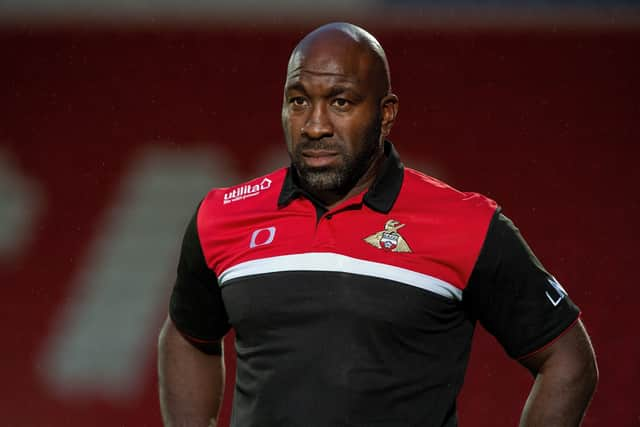Bradford City voted against salary cap for Leagues One and Two - why did they, and are they right?


Thirty-eight of the 48 League One and Two clubs thought it was, so measures to cap wages at £2.5m a year in the third tier and £1.5m in the fourth were pushed through with immediate effect last week.
The players’ union, the Professional Footballers’ Association, are threatening to challenge what it calls an “unlawful” rule, and Bradford City and their manager Stuart McCall believes it is the wrong way to try to control spending.
Advertisement
Hide AdAdvertisement
Hide AdEven before Covid-19 struck, more needed to be done to protect lower-league football finances against the temporary insanity that can afflict owners swept up in the competitiveness.


A couple of seasons ago the Bantams ran up a £4m wage bill trying to escape League One but relegation was not what they had in mind. They are still picking up the pieces.
The season just gone started with Bury becoming the first Football League (EFL) club for 26 years to go out of business, and we still do not know how it will finish. An appeal which will decide whether Stevenage or Macclesfield Town are relegated is to be heard today. At issue is the Silkmen’s punishment for paying players late for the third time last season.
If finances were tough before the Covid-19 lockdown, they have got far tougher since. Premier League and Championship clubs have been playing behind closed doors since re-emerging from hibernation, but only play-off matches have taken place down the ladder since mid-March.
Advertisement
Hide AdAdvertisement
Hide AdWhen 2020-21 gets up and running on September 12 – with the first round of the League Cup expected a week earlier – all 92 clubs will feel the eerieness of football without fans. It is a costly business and the effects are being felt in the transfer market.


League One Portsmouth missed out on signing Barnsley’s Cameron McGeehan because they could not compete with an offer from Oostende, another club controlled by Reds owner Chien Lee. Championship sides such as Sheffield Wednesday and Huddersfield Town have lost players they wanted to keep beyond contracts which expired in the summer. Even Premier League Sheffield United, who dipped their toe into a bigger transfer pond in January by paying £23m for Sander Berge and loaning Panagiotis Retsos and Richairo Zivkovic from Germany and China respectively, are back to more familiar Football League markets.
“The decision and the swiftness in which it’s been reached shows how seriously EFL clubs are taking wage outgoings and inflation bearing in mind the lack of matchday income,” commented Chris Horner, insolvency director at Business Rescue Expert.
After they – or rather the independent disciplinary commission they handed the case over to – dragged their feet so painfully over Sheffield Wednesday’s drawn-out misconduct charge, and the tiresome bickering over if and how the League One season would be resolved, it seems unfair to criticise the League for acting swiftly, but it is not without its problems.
Advertisement
Hide AdAdvertisement
Hide AdLeague Two Bolton Wanderers have already made hefty signings, for example. For salary-cap purposes, Eoin Doyle and Antoni Sarcevic’s wages will be registered as if they were at the division’s agreed average, as will other players already on bigger contracts.
As far as McCall is concerned, preventing clubs from spending money they have worked hard to earn is unfair.
“You’re punishing teams,” he argues.
“You have to work hard to bring money into your football club, be it through season tickets, commercial, selling players or good cup runs. You now can’t plough that back into your business to improve it. It’s not right.
“When you’re bringing someone through the youth team and selling them, or going to the fourth or fifth round of the cup and you can’t put that money back into your squad it’s detrimental to people who want to improve their football club.”
Advertisement
Hide AdAdvertisement
Hide AdClubs gambling money they do have is a different issue, the problem is what to do about cash pumped in by ambitious owners who can lose interest at any point.
If McCall is prepared to work within the rules his club voted against, the PFA are insisting the matter goes to arbitration, and complaining the League “ignored its legal obligation to consult with the PFA and the Professional Football Negotiating and Consultative Committee”.
Discussions about a Championship salary cap are ongoing, and it would be a surprise if anything was agreed in time for next season. A figure of £18m-£20m has been floated.
Too tight a cap will widen the gulf to the Premier League. In January, Leeds United were interested in Dwight Gayle, Che Adams or Andre Gray, whose talent straddles the top of the Championship and the top-flight’s lower reaches, yet well-meaning financial fair play made the transfers impossible.
Advertisement
Hide AdAdvertisement
Hide AdLeague One and Two clubs have responded with the urgency the situation demands, but the time the Championship is taking could be well spent. A complex problem is being attacked with a blunt object.
Editor’s note: first and foremost - and rarely have I written down these words with more sincerity - I hope this finds you well.
Almost certainly you are here because you value the quality and the integrity of the journalism produced by The Yorkshire Post’s journalists - almost all of which live alongside you in Yorkshire, spending the wages they earn with Yorkshire businesses - who last year took this title to the industry watchdog’s Most Trusted Newspaper in Britain accolade.
And that is why I must make an urgent request of you: as advertising revenue declines, your support becomes evermore crucial to the maintenance of the journalistic standards expected of The Yorkshire Post. If you can, safely, please buy a paper or take up a subscription. We want to continue to make you proud of Yorkshire’s National Newspaper but we are going to need your help.
Advertisement
Hide AdAdvertisement
Hide AdPostal subscription copies can be ordered by calling 0330 4030066 or by emailing [email protected]. Vouchers, to be exchanged at retail sales outlets - our newsagents need you, too - can be subscribed to by contacting subscriptions on 0330 1235950 or by visiting www.localsubsplus.co.uk where you should select The Yorkshire Post from the list of titles available.
If you want to help right now, download our tablet app from the App / Play Stores. Every contribution you make helps to provide this county with the best regional journalism in the country.
Sincerely. Thank you.
James Mitchinson
Editor
Comment Guidelines
National World encourages reader discussion on our stories. User feedback, insights and back-and-forth exchanges add a rich layer of context to reporting. Please review our Community Guidelines before commenting.